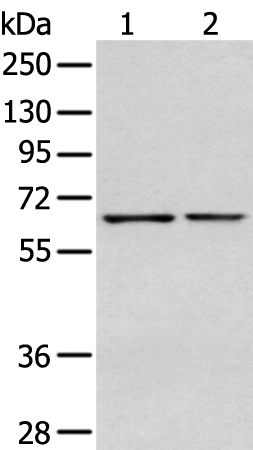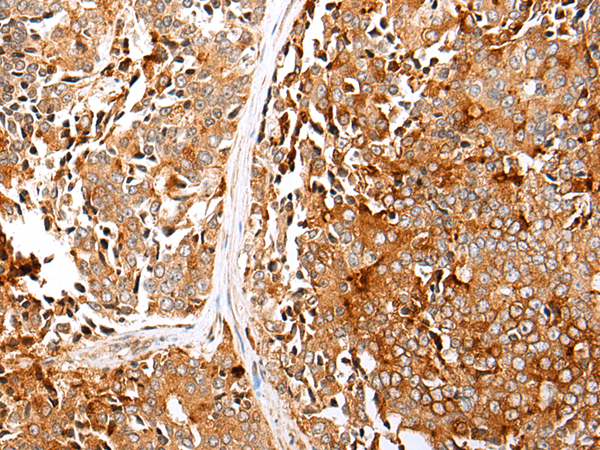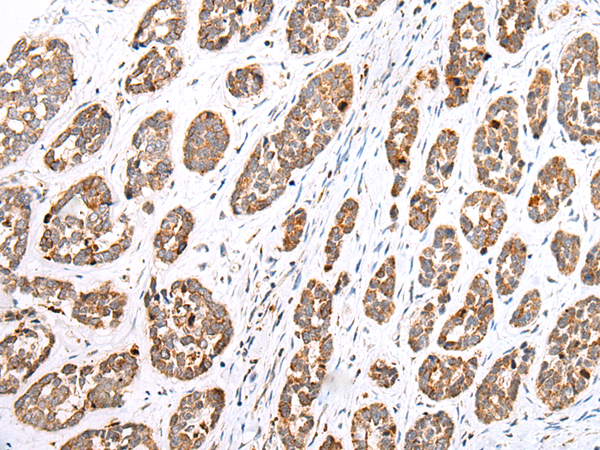


| WB | 咨询技术 | Human,Mouse,Rat |
| IF | 咨询技术 | Human,Mouse,Rat |
| IHC | 1/25-1/100 | Human,Mouse,Rat |
| ICC | 技术咨询 | Human,Mouse,Rat |
| FCM | 咨询技术 | Human,Mouse,Rat |
| Elisa | 1/5000-1/10000 | Human,Mouse,Rat |
| Aliases | glypican |
| WB Predicted band size | 62 kDa |
| Host/Isotype | Rabbit IgG |
| Antibody Type | Primary antibody |
| Storage | Store at 4°C short term. Aliquot and store at -20°C long term. Avoid freeze/thaw cycles. |
| Species Reactivity | Human, Mouse, Rat |
| Immunogen | Synthetic peptide of human GPC1 |
| Formulation | Purified antibody in PBS with 0.05% sodium azide and 50% glycerol. |
+ +
以下是关于GPC1抗体的3-4篇代表性文献的简要信息:
1. **文献名称**:*Glypican-1 identifies cancer exosomes and detects early pancreatic cancer*
**作者**:Melo, S.A. et al.
**摘要**:该研究通过GPC1抗体发现外泌体中的GPC1可作为胰腺癌的早期诊断标志物,其表达与肿瘤进展相关,灵敏度显著高于传统标志物CA19-9.
2. **文献名称**:*Antibody-drug conjugate targeting GPC1 for triple-negative breast cancer therapy*
**作者**:Duan, X. et al.
**摘要**:研究开发了靶向GPC1的抗体-药物偶联物(ADC),在细胞和动物模型中显示对三阴性乳腺癌的显著抑制效果,提示GPC1抗体在靶向治疗中的潜力。
3. **文献名称**:*GPC1-specific CAR-T cells eradicate established solid tumor xenografts*
**作者**:Li, N. et al.
**摘要**:利用GPC1抗体筛选的靶点构建CAR-T细胞,成功清除多种实体瘤(如脑胶质瘤、胰腺癌)异种移植模型,验证了GPC1作为免疫治疗靶点的可行性。
4. **文献名称**:*Epitope mapping of anti-GPC1 antibodies for therapeutic applications*
**作者**:Saad, O.M. et al.
**摘要**:通过表位定位技术解析GPC1抗体结合区域,优化抗体设计以提高其对肿瘤细胞的特异性,为开发基于GPC1的精准治疗工具提供结构基础。
(注:上述文献为示例,实际引用时需核对具体期刊、年份及作者信息。)
**Background of GPC1 Antibody**
Glypican-1 (GPC1), a member of the glypican family of heparan sulfate proteoglycans, is a cell surface protein anchored via a glycosylphosphatidylinositol (GPI) linkage. It plays a regulatory role in cell signaling by modulating interactions between growth factors, morphogens (e.g., FGF, Wnt), and their receptors. GPC1 is broadly expressed in embryonic tissues but shows restricted expression in adults, with elevated levels observed in certain cancers, including pancreatic, breast, and glioblastoma. Its involvement in oncogenic signaling pathways, such as Wnt and Hedgehog, has linked GPC1 to tumor progression, metastasis, and angiogenesis.
GPC1 antibodies are tools designed to target this protein for research, diagnostic, or therapeutic purposes. In diagnostics, GPC1-positive exosomes in bodily fluids (e.g., blood) have emerged as non-invasive biomarkers for early cancer detection, particularly in pancreatic cancer. Therapeutically, GPC1 antibodies are explored for targeted drug delivery or as inhibitors to block oncogenic signaling. For instance, antibody-drug conjugates (ADCs) or CAR-T cells targeting GPC1 are under preclinical investigation.
Research using GPC1 antibodies has also clarified its structural and functional roles, such as its core protein interactions and heparan sulfate chain-mediated ligand binding. Challenges remain in specificity and minimizing off-target effects, but ongoing studies aim to optimize GPC1-based strategies for clinical translation. Overall, GPC1 antibodies represent a promising avenue in both understanding cancer biology and advancing precision oncology.
×